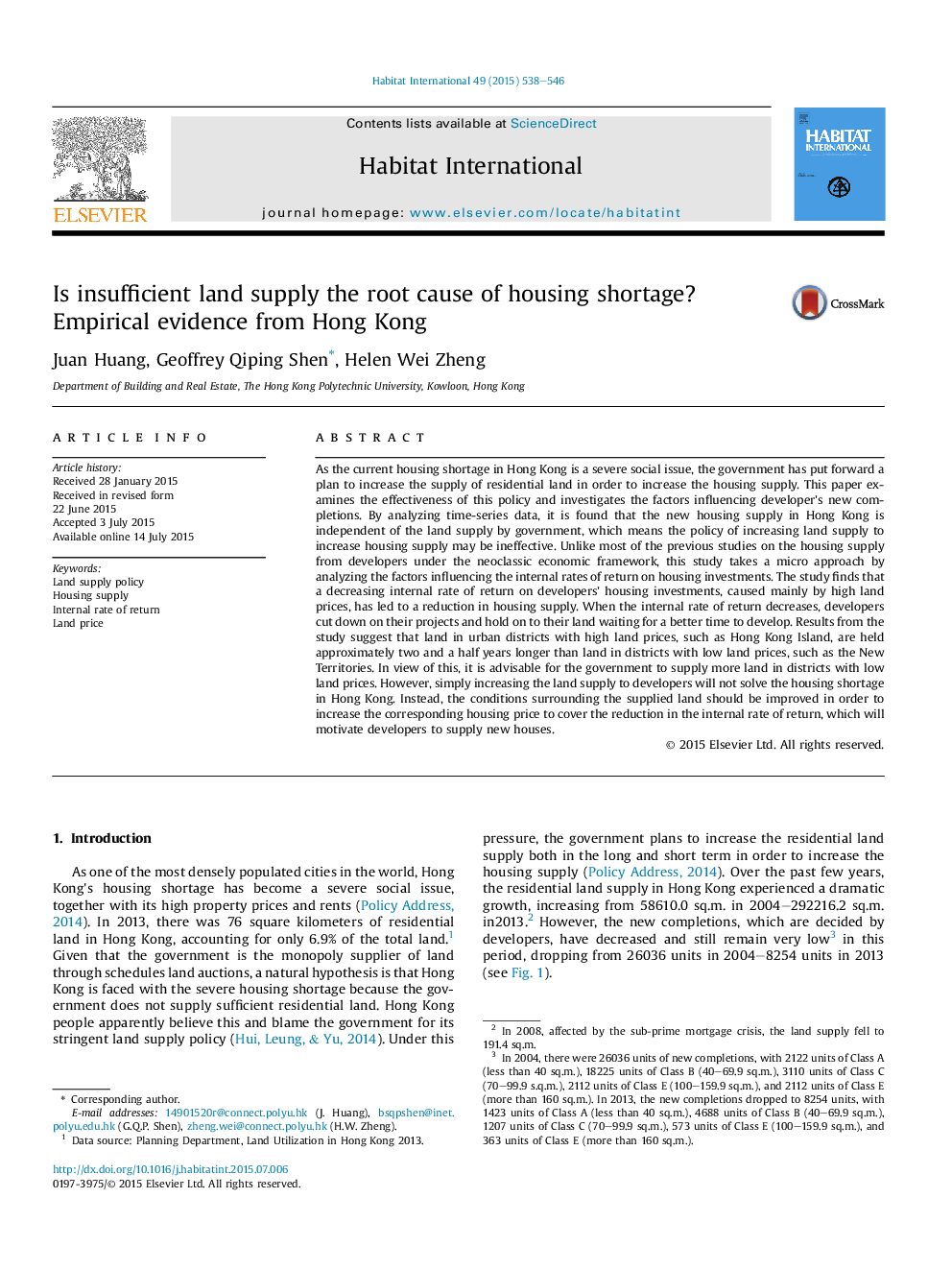| کد مقاله | کد نشریه | سال انتشار | مقاله انگلیسی | نسخه تمام متن |
|---|---|---|---|---|
| 7456349 | 1484494 | 2015 | 9 صفحه PDF | دانلود رایگان |
عنوان انگلیسی مقاله ISI
Is insufficient land supply the root cause of housing shortage? Empirical evidence from Hong Kong
ترجمه فارسی عنوان
آیا زمین به دلیل کمبود مسکن ریشه ای است؟ شواهد تجربی از هنگ کنگ
دانلود مقاله + سفارش ترجمه
دانلود مقاله ISI انگلیسی
رایگان برای ایرانیان
کلمات کلیدی
سیاست عرضه ی زمین، عرضه مسکن، نرخ بازده داخلی، قیمت زمین،
ترجمه چکیده
همانطور که کمبود مسکن فعلی در هنگ کنگ یک مسئله اجتماعی شدید است، دولت برنامه ای برای افزایش عرضه زمین های مسکونی به منظور افزایش عرضه مسکن ارائه کرده است. در این مقاله اثربخشی این سیاست مورد بررسی قرار می گیرد و عوامل موثر بر تکمیل های جدید توسعه را مورد بررسی قرار می دهد. با تجزیه و تحلیل داده های سری زمانی، نشان می دهد که عرضه مسکن جدید در هنگ کنگ مستقل از عرضه زمین توسط دولت است، یعنی سیاست افزایش عرضه زمین برای افزایش عرضه مسکن ممکن است بی اثر باشد. بر خلاف بسیاری از مطالعات قبلی در مورد عرضه مسکن از توسعه دهندگان تحت چارچوب اقتصادی نئوکلاسیک، این مطالعه با استفاده از تحلیل عوامل موثر بر میزان بازده داخلی سرمایه گذاری های مسکونی، یک رویکرد میکرو را دنبال می کند. این مطالعه نشان می دهد که کاهش نرخ بازگشت داخلی سرمایه گذاران مسکن توسعه دهندگان، که عمدتا به دلیل قیمت بالای زمین ایجاد شده است، منجر به کاهش عرضه مسکن شده است. هنگامی که نرخ بازگشت داخلی کاهش می یابد، توسعه دهندگان پروژه های خود را کاهش می دهند و به سرزمین خود ادامه می دهند و منتظر زمان بیشتری برای توسعه هستند. نتایج این تحقیق نشان می دهد که زمین در مناطق شهری با قیمت های بالای زمین، مانند جزیره هنگ کنگ، تقریبا دو و نیم سال طولانی تر از زمین در مناطق با قیمت های پایین زمین، مانند سرزمین های جدید است. با توجه به این امر، دولت بهتر است که زمین های بیشتری را در مناطق با قیمت پایین زمین عرضه کند. با این حال، به سادگی افزایش عرضه زمین به توسعه دهندگان کمبود مسکن در هنگ کنگ را حل نمی کند. در عوض، شرایط اطراف زمین عرضه شده باید بهبود یابد تا قیمت مسکن مربوط به آن کاهش یابد تا کاهش نرخ بازده داخلی صورت گیرد که باعث ایجاد توسعه دهندگان برای عرضه خانه های جدید می شود.
موضوعات مرتبط
علوم انسانی و اجتماعی
علوم اجتماعی
توسعه
چکیده انگلیسی
As the current housing shortage in Hong Kong is a severe social issue, the government has put forward a plan to increase the supply of residential land in order to increase the housing supply. This paper examines the effectiveness of this policy and investigates the factors influencing developer's new completions. By analyzing time-series data, it is found that the new housing supply in Hong Kong is independent of the land supply by government, which means the policy of increasing land supply to increase housing supply may be ineffective. Unlike most of the previous studies on the housing supply from developers under the neoclassic economic framework, this study takes a micro approach by analyzing the factors influencing the internal rates of return on housing investments. The study finds that a decreasing internal rate of return on developers' housing investments, caused mainly by high land prices, has led to a reduction in housing supply. When the internal rate of return decreases, developers cut down on their projects and hold on to their land waiting for a better time to develop. Results from the study suggest that land in urban districts with high land prices, such as Hong Kong Island, are held approximately two and a half years longer than land in districts with low land prices, such as the New Territories. In view of this, it is advisable for the government to supply more land in districts with low land prices. However, simply increasing the land supply to developers will not solve the housing shortage in Hong Kong. Instead, the conditions surrounding the supplied land should be improved in order to increase the corresponding housing price to cover the reduction in the internal rate of return, which will motivate developers to supply new houses.
ناشر
Database: Elsevier - ScienceDirect (ساینس دایرکت)
Journal: Habitat International - Volume 49, October 2015, Pages 538-546
Journal: Habitat International - Volume 49, October 2015, Pages 538-546
نویسندگان
Juan Huang, Geoffrey Qiping Shen, Helen Wei Zheng,
